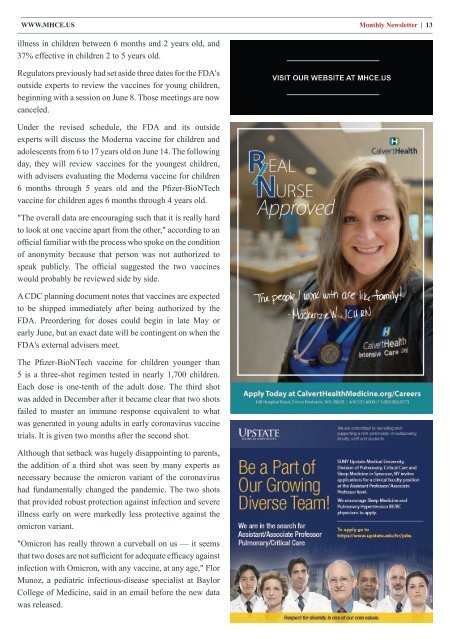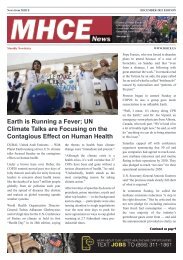You also want an ePaper? Increase the reach of your titles
YUMPU automatically turns print PDFs into web optimized ePapers that Google loves.
WWW.<strong>MHCE</strong>.US Monthly <strong>Newsletter</strong> | 13<br />
illness in children between 6 months and 2 years old, and<br />
37% effective in children 2 to 5 years old.<br />
Regulators previously had set aside three dates for the FDA's<br />
outside experts to review the vaccines for young children,<br />
beginning with a session on <strong>June</strong> 8. Those meetings are now<br />
canceled.<br />
VISIT OUR WEBSITE AT <strong>MHCE</strong>.US<br />
Under the revised schedule, the FDA and its outside<br />
experts will discuss the Moderna vaccine for children and<br />
adolescents from 6 to 17 years old on <strong>June</strong> 14. The following<br />
day, they will review vaccines for the youngest children,<br />
with advisers evaluating the Moderna vaccine for children<br />
6 months through 5 years old and the Pfizer-BioNTech<br />
vaccine for children ages 6 months through 4 years old.<br />
"The overall data are encouraging such that it is really hard<br />
to look at one vaccine apart from the other," according to an<br />
official familiar with the process who spoke on the condition<br />
of anonymity because that person was not authorized to<br />
speak publicly. The official suggested the two vaccines<br />
would probably be reviewed side by side.<br />
A CDC planning document notes that vaccines are expected<br />
to be shipped immediately after being authorized by the<br />
FDA. Preordering for doses could begin in late May or<br />
early <strong>June</strong>, but an exact date will be contingent on when the<br />
FDA's external advisers meet.<br />
The Pfizer-BioNTech vaccine for children younger than<br />
5 is a three-shot regimen tested in nearly 1,700 children.<br />
Each dose is one-tenth of the adult dose. The third shot<br />
was added in December after it became clear that two shots<br />
failed to muster an immune response equivalent to what<br />
was generated in young adults in early coronavirus vaccine<br />
trials. It is given two months after the second shot.<br />
Although that setback was hugely disappointing to parents,<br />
the addition of a third shot was seen by many experts as<br />
necessary because the omicron variant of the coronavirus<br />
had fundamentally changed the pandemic. The two shots<br />
that provided robust protection against infection and severe<br />
illness early on were markedly less protective against the<br />
omicron variant.<br />
"Omicron has really thrown a curveball on us <strong>—</strong> it seems<br />
that two doses are not sufficient for adequate efficacy against<br />
infection with Omicron, with any vaccine, at any age," Flor<br />
Munoz, a pediatric infectious-disease specialist at Baylor<br />
College of Medicine, said in an email before the new data<br />
was released.


















